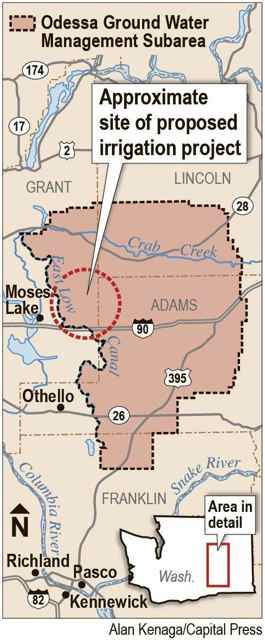forum
library
tutorial
contact

Irrigators Seek Support
in Olympia for Stalled Project
by Don Jenkins
Capital Press, December 9, 2014
|
the film forum library tutorial contact |

|
Irrigators Seek Support
by Don Jenkins
|
The Columbia-Snake River Irrigators Association doesn't want state money, but it is
asking for political support for a project to irrigate 14,000 acres in the Odessa Subarea.
 OLYMPIA -- A private group encountering stiff opposition to its proposal to build an irrigation system for 14,500 acres in the Odessa Subarea is taking its case to the Legislature.
OLYMPIA -- A private group encountering stiff opposition to its proposal to build an irrigation system for 14,500 acres in the Odessa Subarea is taking its case to the Legislature.
The Columbia-Snake River Irrigators Association says it has lined up $42 million in private financing to build lines to bring Columbia River water to 12 landowners north of Interstate 90 and east of Moses Lake.
The area includes land now irrigated with groundwater drawn from the rapidly depleting Odessa aquifer.
The association's board representative, Darryll Olsen, says his project would be quicker, cheaper and more certain than waiting for a government project that has yet to be engineered or financed. "We could have been pushing dirt in October," he said.
The association, however, needs permission from the U.S. Bureau of Reclamation to tap into the East Low Canal. The agency's Columbia-Cascades area manager, Dawn Wiedmeier, said Olsen's project would interfere with a larger plan the bureau has worked out with the state Department of Ecology and three irrigation districts to bring surface water to 70,000 acres now served by wells in the Odessa Subarea.
The plan was developed over nearly a decade and finalized in 2013.
"His plan wouldn't meet the purposes and needs of our plan," Wiedmeier said.
The East Columbia Basin Irrigation District is designing its own system, though there is no projected date for delivering water. District manager Craig Simpson said Olsen's plan relies on only serving customers closest to the canal. "It's easy to be economical when you don't have to take the water anywhere," he said.
Without those landowners helping bear the cost, a system to serve landowners farther out would be economically unfeasible, Simpson said.
Olsen argues that extending an irrigation system to all eligible landowners will make costs too high for many anyway, including farmers close to the canal.
He said he fears irrigation districts will "horse around" for two or three years, and as wells run dry turn to the private sector to put together financing. By then, he said, interest rates will be higher.
In search of political support, Olsen spoke Dec. 5 to the House Capital Budget Committee at the invitation of the committee's chairman, Snohomish Democrat Hans Dunshee.
Dunshee said he wanted to learn more about a project that wasn't asking for the public's money. "I appreciate what they're doing," he said.
"The feds aren't giving out money for projects like this. The state is strapped, with school projects that need funding," Dunshee said. "He (Olsen) was sort of desperate, looking for an ear. I said, 'I think you need to tell this story to the Legislature.'"
Olsen asked state lawmakers, who have no direct authority over the Bureau of Reclamation, to get the ecology department behind the project.
"We don't need money. But we need the power of your direction to the state and to the bureau to get that contract and let us start," he told lawmakers.
Asked whether state lawmakers have any influence over the bureau, Wiedmeier said: "We get our authority and funding from Congress."
Olsen said his plan represents a break from relying on government for Columbia Basin water projects. "This is so foreign to the (irrigation) district, to the bureau. We frighten them. They've not seen private-sector development before. They don't understand private-sector financing. I really believe it's cultural," he said.
The ecology department's Derek Sandison, who heads the state's Office of Columbia River, said in an interview that the state has spent years and millions of dollars to make surface water available to the Odessa Subarea.
"It was never about getting water to Darryll's clients," he said. "That is heavily subsidized water."
Dunshee said he had wanted to hear opposing viewpoints, but Sandison and Simpson were in Spokane at the annual conference of the Washington State Water Resources Association.
Dunshee said he expects to pick up the subject again when the Legislature convenes in January for its regular session.
Rep. Judy Warnick, R-Moses Lake, said she's tried to mediate a comprise. "It didn't work real well," she said.
Warnick, who was elected to the state Senate in November, said she wants to salvage Olsen's plan, but while ensuring other landowners aren't hurt by it.
"I would like to see a form of his plan work," she said. "The problem is, they're going to have to give on both sides."
Related Pages:
Addressing Irrigators' Concerns by BlueFish, Public Testimony at Pasco WA
Funding to Finish East Low Canal a 'Rough Pull' by Matthew Weaver, Capital Press, 11/11/14
learn more on topics covered in the film
see the video
read the script
learn the songs
discussion forum
